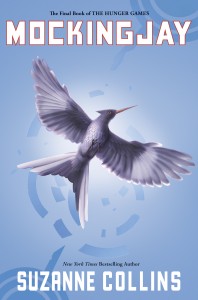 Suzanne Collins’ final installment to her Hunger Games Trilogy (Hunger Games and Catching Fire) is finally here. Mockingjay, starts off where Catching Fire’s cliff hanger ending left us. Once again, Collins does not disappoint when it comes to imaginative post-apocalyptic Earth. She earns her title as a best-selling author by not only making this world feel eerily real, but also fantastic with her futuristic perspective of the land, Panem.
Suzanne Collins’ final installment to her Hunger Games Trilogy (Hunger Games and Catching Fire) is finally here. Mockingjay, starts off where Catching Fire’s cliff hanger ending left us. Once again, Collins does not disappoint when it comes to imaginative post-apocalyptic Earth. She earns her title as a best-selling author by not only making this world feel eerily real, but also fantastic with her futuristic perspective of the land, Panem.
Katniss is written as today’s generation’s modern superhero. She has no alien origin, or mutant power. Yet, she is a heroine nonetheless, a hero that is human, flawed, but powerful. She reminds Greek Mythology buffs of Artemis, the goddess of the hunt with her archery capabilities, and inner strength. Unlike her godly inspiration, Katniss is far from innocent. Having survived the gruesome and violent Hunger Games, not once, but twice, she must learn to trust her hunting instincts to protect those she loves and fight for whats left of her world.
Along with Katniss’ tough image, Collins’ brilliantly reminds us that she’s just a girl of seventeen; one who has seen death at a caliber few have witnessed. She has points within the plot where she breaks down to cry, and even at points come close to a panic attack. These do not weaken her character, yet almost the opposite. With these ‘breakdowns’, readers see that she is no superhero, but just a girl; one who knows whats at stake and what she may lose. Had we not seen this, Katniss would surely lose the elements that make her human, and almost real. Her weaknesses are out in the open not only for the characters to see, but for the readers as well. Her heart is torn by love, her mind psychologically holding on to take in what is real versus what is not, and her gut is continuously yearning her to fight-even if it will cost those she loves.
Symbolism is masterfully used throughout the novel. The Mockingjay, the most obvious of examples is what Katniss’ quest has been about all along. The symbol, which to certain characters, means something different, is what makes it a word that is definitely title-worthy. The novel causes readers to question themselves and what they feel this symbol represents, as well as get a front row seat into how Katniss views this powerful word.
Collins’ plot at this stage in the game, is still as noteworthy as in Hunger Games and Catching Fire. However, it’s almost sad to say that a reader can at times feel next to nothing when she describes the brutal violence in the book. Having read books one and two, almost conditions a reader to the point where it’s not as surprising to come across death with the initial reactions found in the first two novels. Collins’ may have known this, as she strategically places certain characters in shocking scenes in which they meet their demise.
Whether a reader likes it or not, Collins’ use of irony is in full swing in this regard, and her metaphor for life, death, and political cruelty shine through these characters’ horrific deadly examples. *Note to readers, you may not be happy with who stays, and who goes, but Collins’ does not wastefully murder important characters without reason. It is either done to play on a literary element such as irony. Therefore, try not to hate on the author, until you figure out the grand scheme of things.
Overall, Mockingjay, meant to be anticipated for the summer season, was certainly worth waiting for. Katniss’ battle will be remembered by this generation (and those to come) right next to Harry Potter’s journey , and Bella Swan’s love of vampires. Katniss Everdeen, ‘the girl on fire’ has certainly lit the pages and her story is definitely one that should spread like wildfire.

Leave a Reply